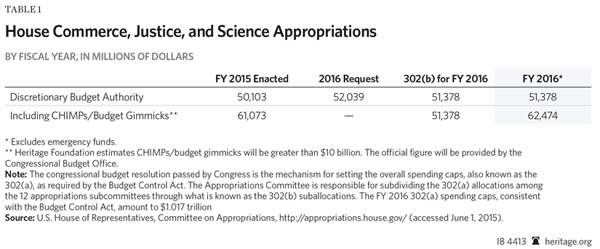The Commerce, Justice, and Science (CJS) appropriations bill will be the fourth discretionary spending bill considered in the House of Representatives this year. The CJS appropriations bill provides funding for the Departments of Commerce and Justice. It also includes funding for the National Science Foundation and the National Aeronautics and Space Administration, among other agencies.
According to the House Committee on Appropriations, the bill would provide $51.378 billion in discretionary budget authority for fiscal year (FY) 2016. This is an increase of $1.275 billion above current year levels, although it is $660.7 million below the President’s budget submission. The bill clearly increases spending, but the advertised funding levels conceal $10 billion through a budget gimmick, which elevates the overall budget authority to $62.5 billion—nearly $11.1 billion above the 302(b) spending limits in Table 1.
Commerce, Justice, and Science Recommendations
In March, The Heritage Foundation published “The Budget Book: 106 Ways to Reduce the Size and Scope of Government.”[1] It includes an analysis of the entire budget and recommendations for spending priorities within the CJS appropriations bill. The recommendations provide suggestions for reduced spending in various CJS programs.
Recommended for elimination:
- International Trade Administration. The CJS bill provides $472 million for FY 2016, the same level as current funding.
- The Economic Development Administration. The CJS bill provides $250 million for FY 2016, the same level as current funding.
- Hollings Manufacturing Extension Partnership. The CJS bill provides $130 million for FY 2016, the same level as current funding.
- Advanced Manufacturing Technology Consortia. The CJS bill provides no funding for this program.
- Minority Business Development Agency. The CJS bill provides $32 million for FY 2016, $2 million more than current funding.
- Community Oriented Policing Services (COPS) program. The CJS bill provides $235 million for FY 2016, $27 million more than current funding.
- State and local grants within the Office of Justice programs. The CJS bill provides $1.015 billion for FY 2016, $225 million less than current funding.
- Violence Against Women Act grants. The CJS bill provides $474 million for FY 2016, $44 million more than current funding.
Below are additional programs highlighted for elimination by The Heritage Foundation:[2]
- The National Science Foundation’s Education and Human Resources Division. The CJS bill provides $866 million for FY 2016, the same level as current funding.
- The Legal Services Corporation. The Heritage Foundation recommends the program be devolved to local communities and the private sector. The CJS bill provides $300 million for FY 2016, $75 million less than current funding.
The Heritage “Budget Book” recommends funding reductions for the following programs:
- Civil Rights Division of the Department of Justice. The CJS bill provides $147 million for FY 2016, $3 million more than current year funding. Heritage recommends reducing funding levels by 20 percent.
- Environmental & Natural Resources Division of the Department of Justice. The CJS bill provides $110 million for FY 2016, $3 million more than current funding. Heritage recommends reducing funding levels by 20 percent.
- Community Relations Services of the Department of Justice. The CJS bill provides $13 million for FY 2016, $750,000 more than current funding. Heritage recommends reducing funding by 50 percent.
- Bureau of Alcohol, Tobacco, Firearms, and Explosives. The CJS bill provides $1.25 billion for FY 2016, $49 million more than current funding. Heritage recommends reducing funding by 20 percent.
The $10 Billion Budget Gimmick
The FY 2016 CJS appropriations bill includes a frequently used—and infamous—budget gimmick, which manipulates a federal fund known as the Crime Victims Fund (CVF) in a manner referred to as CHIMP (Changes in Mandatory Program). Congress uses the CVF to manipulate spending levels.
The CVF accounting gimmick places a cap (obligation limitation) on spending on a pool of money designated for the beneficiaries of the fund. By limiting the money that may be spent from that fund, Congress scores the remaining unspent funds as a “savings.” In reality, it is unlikely that spending from the CVF would ever exceed the capped levels. However, the presence of a cap allows for any money in the CVF that exceeds that arbitrary cap to be deemed as “savings,” which Congress uses to offset higher levels of new spending.[3]
The CJS bill maximizes the use of this gimmick. The bill includes a one-year cap on the CVF, set at $2.7 billion for FY 2016. By setting this cap, or CHIMP, the bill produces an entirely phony net savings of approximately $10.8 billion.
Funding Expired Government Programs
When appropriation bills provide new budget authority for programs whose statutory authorization (the legal authority for the program to continue) has expired, that is known as an unauthorized appropriation. Long-standing rules of the House and Senate prohibit the funding of unauthorized appropriations. This was intended to place the jurisdiction of a program’s policy objective with the authorizing committees—not the appropriators. However, Congress has made a practice of ignoring this rule, and continually authorizes funding for programs whose authorizations have long since expired—a technical violation of law, and a wasted opportunity to review these programs for reform or elimination.

Conclusion
The House Commerce, Justice, and Science appropriations bill is a budget boondoggle. As in previous years, the FY 2016 CJS bill funds wasteful, duplicative, and unauthorized programs, such as the International Trade Administration and the Economic Development Administration. More important, the budget gimmicks allow Congress to thwart budget caps by more than $10 billion annually—more than $90 billion over 10 years. As stewards of the taxpayer, it is time that Congress adopted honesty and integrity in the federal budget. The CJS appropriations bill—and all appropriations bills considered by Congress—should end wasteful programs and be free of accounting gimmicks.
—John Gray is a Research Fellow in Federal Fiscal Affairs in the Thomas A. Roe Institute for Economic Policy Studies, of the Institute for Economic Freedom and Opportunity, at The Heritage Foundation.



